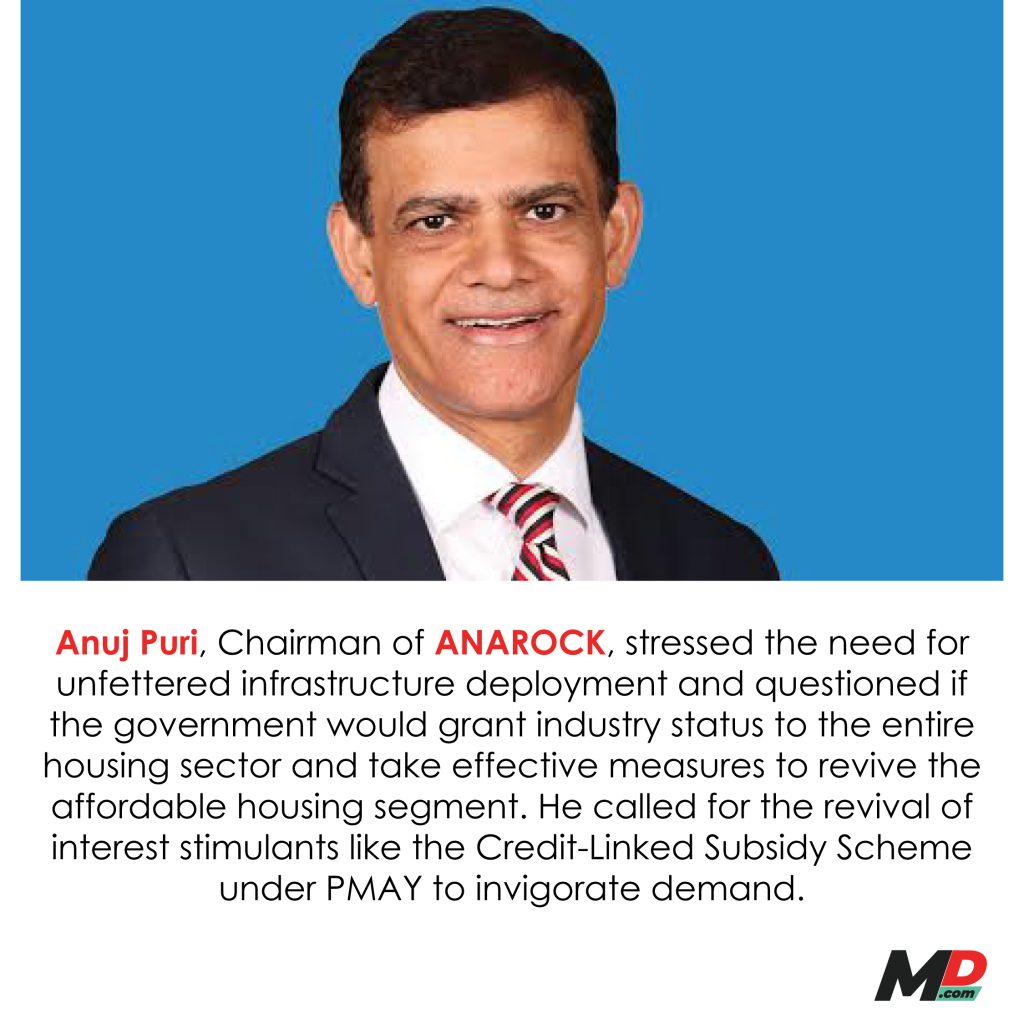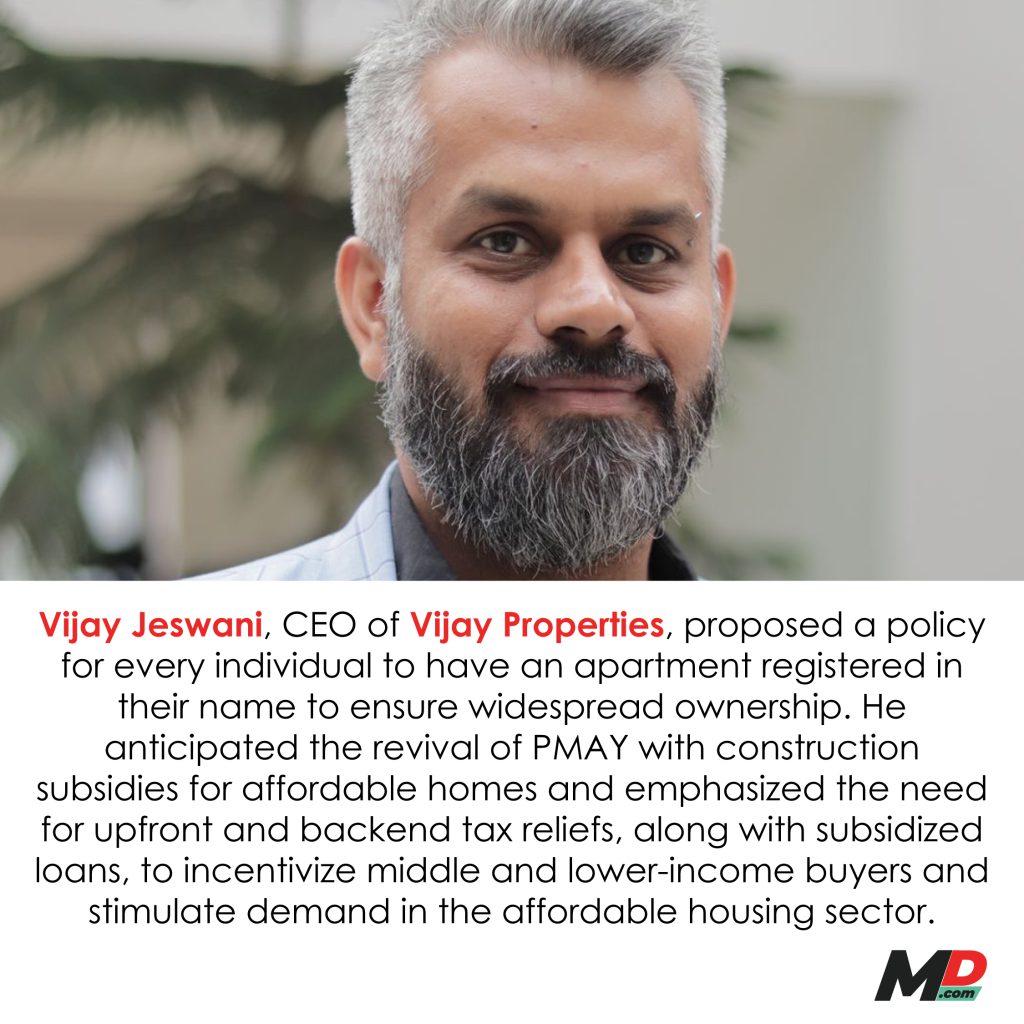Business
Real Estate Sector Calls for Major Reforms in Union Budget 2024-25
Published
7 months agoon

As the Union Budget 2024-25 approaches, the real estate sector is eager for the Modi 3.0 regime’s response to its pressing needs, hoping for measures to boost market sentiment. The future of the sector hinges on comprehensive infrastructure development to enhance urban living standards and promote new growth areas.
The real estate community is pondering, “Will the government finally grant industry status to the entire housing sector? And will it take effective steps to rejuvenate the affordable housing segment, which has been struggling since 2021?”
According to research by CREDAI-MCHI, the Indian housing market has shown remarkable resilience in 2024. Housing sales have reached unprecedented levels in the top seven cities, with 4.93 lakh residential units sold in FY23-24 and 4.47 lakh units launched. However, sustaining this momentum is crucial, especially as current growth is skewed towards mid-range and premium housing. The housing needs of India’s lower-income groups cannot be met if the focus remains solely on higher-priced homes while affordable housing continues to decline.

Ms. Manju Yagnik, Vice Chairperson of Nahar Group and Senior Vice President of NAREDCO-Maharashtra, said, “With the Union Budget 2024-25 approaching, the real estate sector anticipates significant reforms and support. Key expectations include increased allocations and incentives under the Pradhan Mantri Awas Yojana (PMAY) to boost affordable housing for economically weaker sections and low-income groups . Additionally, there is a demand for greater tax relief on home loans and higher deductions on interest payments to make homeownership more accessible.
“The sector also seeks reforms in the GST structure to reduce the overall tax burden on homebuyers and developers. Simplifying GST rates for under-construction properties and reducing stamp duty rates are expected to stimulate housing demand . Furthermore, the industry seeks to streamline land acquisition processes and improve infrastructure development to support real estate growth. Overall, the real estate sector is not just hopeful, but optimistic that the upcoming budget will introduce measures to promote affordability, enhance liquidity, and provide the much-needed impetus for sustainable growth. This optimism is a testament to the sector’s resilience and its belief in the potential of the upcoming budget to shape a brighter future for the industry.”

Keval Valambhia, COO of MCHI-CREDAI, said, “It is suggested that the government reintroduces the 100% tax holiday for affordable housing developers. This benefit, previously available under Section 80-IBA of the Finance Act, 2016, provided significant tax relief on profits from affordable housing projects. Such incentives are crucial to encourage developers to focus on affordable housing. Reviving the Credit-Linked Subsidy Scheme (CLSS) under the Pradhan Mantri Awas Yojana (PMAY) is essential. This scheme, which expired in 2022, provided subsidies to first-time buyers of affordable homes and should be reinstated. The CLSS was available for housing loans to Economically Weaker Sections (EWS) and Lower Income Groups (LIG) for new constructions and home improvements. Reintroducing this subsidy will stimulate demand in the affordable housing segment.
“There is also a pressing need to redefine the criteria for affordable housing to broaden the benefits for home buyers. According to the Ministry of Housing and Urban Poverty Alleviation, affordable housing is defined by property size, price, and buyers’ income. Currently, it is described as a house with up to 90 sq. m. of carpet area in non-metropolitan cities and 60 sq. m. in major cities, priced up to Rs 4.5 million. However, these price caps are not viable in many cities. For instance, in Mumbai, a budget of Rs 4.5 million is unrealistic. Even the government-owned MHADA houses start at a threshold of Rs 6 million. The threshold should be increased to at least Rs 8.5 million for Mumbai and Rs 6.0-6.5 million for other major cities. This adjustment would allow more homes to qualify as affordable, enabling buyers to benefit from lower GST rates and government subsidies. From a practical viewpoint, I suggest removing the price cap from the definition of affordable housing and declaring all homes under 60 sq. m. as affordable homes to boost the affordable housing sector in India.”

Ashwin Sheth, CMD of Ashwin Sheth Group, said, “The prospect of stability in India’s housing sector, bolstered by a focused approach on infrastructure development by the government, promises a substantial boost to affordable housing initiatives driven by the government’s PM Awas Yojana (PMAY). India is projected to become the third-largest global economy by 2027, ensuring robust housing demand due to stable policymaking and infrastructure development.
“The sector anticipates policies that enhance transparency, reduce expenses, and promote sustainable growth. With the government fortifying affordability in housing and stimulating demand, we also look forward to a potential tax relief scheme. The need for policy reorientation, cost reductions, and tax rationalization to drive growth, including GST reforms, remains paramount for sustaining the upward trajectory of the Indian real estate market and ensuring its alignment with evolving economic dynamics and societal needs.”

Mr. Prashant Sharma, President of NAREDCO Maharashtra, said, “As we approach the upcoming budget, the real estate sector, particularly in Maharashtra, holds several key expectations that can significantly impact our industry’s growth and sustainability. NAREDCO Maharashtra, under my leadership, presents the following pre-budget expectations:
“Enhancing tax benefits for homebuyers, especially under Section 80C and Section 24(b), would provide a much-needed boost to housing demand. Increasing the limit of deduction on home loan interest will make homeownership more attractive and affordable for the common man. The introduction of a single-window clearance system for all real estate projects would streamline the approval process, reducing delays and costs. This measure would accelerate project completions and enhance the ease of doing business in the sector.
“Continued focus on affordable housing is crucial. We urge the government to extend the benefits under the Pradhan Mantri Awas Yojana (PMAY) and provide additional incentives to developers engaged in affordable housing projects. Also, there’s a need to redefine the definition of affordable housing, proposing an increase in the cap from Rs 45 lakh to Rs 1 crore, particularly in metro cities. This will help bridge the housing gap and provide homes to the economically weaker sections of society, boosting both affordable and mid-segment housing.”

Anuj Puri, Chairman of ANAROCK, a real estate consultancy firm, said, “The future of the overall industry also depends on unfettered infrastructure deployment to support and improve urban living standards, as well as to develop and promote newer areas. Will the government finally decide to accede to the long-standing demand for industry status for the entire housing sector? Will it take ‘real’ measures to revive the affordable housing segment, which has been on a steady decline after the pandemic? This remains to be seen.
“Many interest stimulants previously extended to buyers and developers of affordable housing have expired in the last two years. This critical segment must be revived with high-impact measures like tax breaks for developers to incentivize a focus on affordable housing and for buyers to improve affordability. Some measures which the government could consider include a Credit-Linked Subsidy Scheme under PM Awas Yojana. This scheme for EWS/LIG, which expired in 2022, should be revived to incentivize first-time buyers of affordable homes across cities. This will invigorate demand in this segment.”

Chintan Vasani, founder and partner of Wisebiz Developers, said, “As anticipation builds for the upcoming budget, the real estate sector is eager for measures to enhance affordability and drive demand. Key expectations include increasing the deduction limit on home loan interest to incentivize home buyers, broadening the definition of ‘affordable housing’ under the Pradhan Mantri Awas Yojana by raising the price cap from Rs 45 lakh to reflect city-specific market dynamics, allocating additional funds to the Special Window for Completion of Affordable and Mid-Income Housing Projects (SWAMIH) fund to stimulate the real estate market, and advocating for ‘infrastructure’ status for the entire real estate sector, a long-standing demand. Reviving and extending significant benefits like tax breaks is crucial to spur developers to build more affordable housing and enable buyers to access such homes.”

Vijay Jeswani, CEO, Vijay Properties, said, “The government should introduce a policy where every individual is entitled to have an apartment registered in their name, akin to an Aadhar card and identity. This would ensure widespread ownership and empower citizens towards property ownership, aligning with initiatives like the PMAY. In the upcoming budget, I anticipate the revival of PMAY with subsidies on construction for affordable homes. Additionally, upfront and backend tax reliefs, along with subsidized loans, will be crucial incentives for middle and lower-income buyers.

Dhruv Raicha, Advocate, and partner at Shreeji Constructions, highlighted the real estate sector’s eager anticipation of measures that will spur growth and address persistent challenges as the upcoming Union Budget approaches. Emphasizing the sector’s substantial contribution to the nation’s GDP, he stressed the need for focused attention to foster sustainable development and bolster economic activity.
Key expectations for the forthcoming budget include:
- Enhanced Tax Benefits for Homebuyers: Proposing an increase in the limit of tax deductions under Section 24(b) for home loan interest from the current ₹2 lakh to ₹5 lakh. This adjustment aims to significantly boost affordability and stimulate demand in the residential segment.
- Single-Window Clearance System: Advocating for the implementation of a streamlined approval mechanism to eliminate bureaucratic delays and expedite project approvals. Such a system is crucial for accelerating project execution, ensuring timely delivery, and enhancing investor confidence.
You may like
-


Vertiv Acquires Centrifugal Chiller Technology to Broaden its Global Solutions Portfolio in Support of High-Performance Compute and AI
-


Spinny’s 2024 Auto Trends: 76% First-Time Buyers, 60% of Women Prefer Automatic Hatchbacks
-


“Dilwale” to perform Dance of Democracy on February 5
-


Electric ferries to transform Mumbai port travel in 2025
-


HGS appoints Anshuman Singh as new CEO for HGS UK
-


Tata Elxsi and National Aerospace Laboratories Sign Strategic Partnership for Advanced Air Mobility


